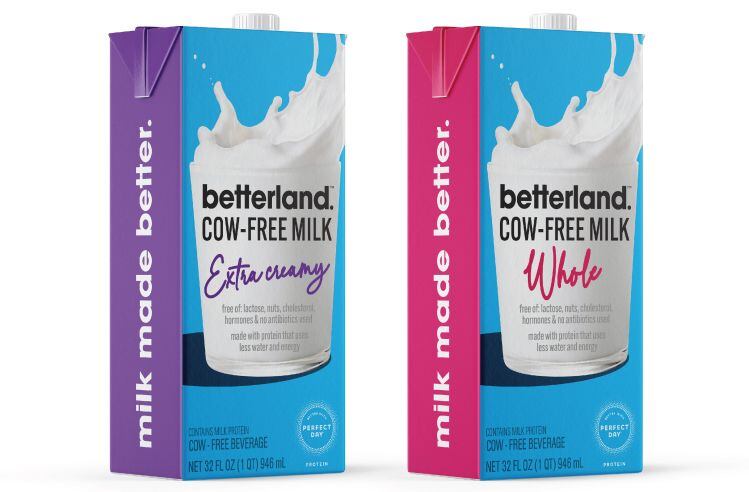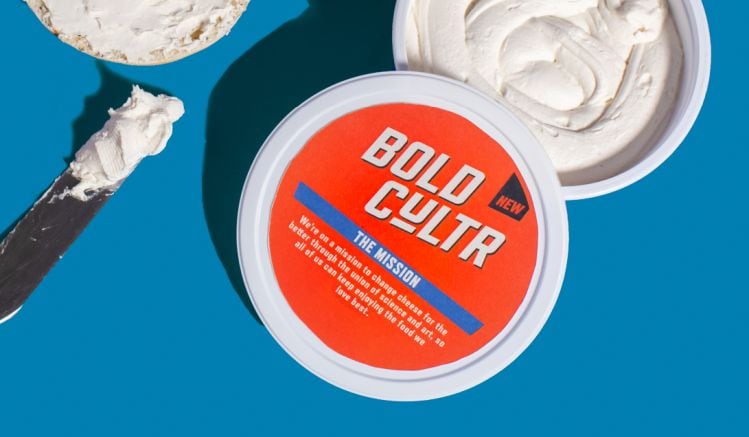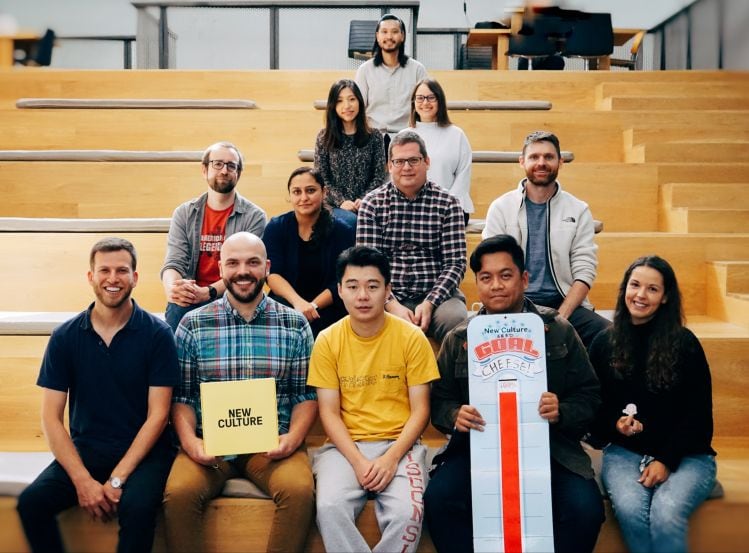Debuting to the trade at the Natural Products Expo West show in Anaheim next month, betterland’s lactose-free milk will be available in retailers this summer in whole and extra creamy variants, and is the first of a series of animal-free products from betterland foods, a new company from Think! founder Lizanne Falsetto.
Falsetto told FoodNavigator-USA: "We are in discussions with several retail partners for the retail launch, but will be able to share more information about that as we close in. Additionally, we will be supporting retail launches with corresponding in-store materials and other marketing initiatives."
Claimed to have “the same cooking, whipping, steaming, frothing, and baking functionality” as regular dairy milk, it is being positioned as a better choice for the environment for consumers that do not feel current plant-based offerings hit the mark on taste or performance (according to Danone, "more than 50% of consumers tell us that what has kept them from switching to plant based is taste and texture that is not matching their expectations").
The same ‘cooking, whipping, steaming, frothing, and baking functionality’ as regular dairy milk?
While most plant-based milk alternatives typically highlight a star ingredient in the product name and marketing (almondmilk, oatmilk, soymilk), betterland milk is one of a newer wave of products that attempt to more precisely mimic the taste and texture of dairy milk, with packaging that reflects a more generic ‘milk’ such as NotMilk from NotCo, or Silk NextMilk from Danone.
Unlike these two brands, however, betterland milk is not 100% plant-based, but contains the primary whey protein found in dairy milk (beta-lactoglobulin), sourced from Perfect Day, which uses a genetically engineered strain of fungi rather than a cow, to make its ‘animal-free’ proteins.
As such, it contains a milk allergen warning on the front of pack as it contains ‘real’ dairy protein.
bettermilk cow-free milk (whole):
Ingredients: Whey base (water, animal-free whey protein), coconut oil (medium chain triglycerides), less than 2%: cane sugar, sunflower oil, inulin, glycerine, dipotassium phosphate, gellan gum, pea starch, natural flavors, sodium phosphate, locust bean gum, pea flower extract, sea salt
Vitamin/mineral blend: calcium (35%DV), vitamin D (25%DV), vitamin B12 (45%DV) Riboflavin (35%DV), phosphorus (25%DV), Pantothenic acid (20%DV), vitamin A (10%DV), vitamin C (10%DV), thiamin (10%DV), vitamin B6 (8%DV), magnesium (6%DV), potassium (6%DV)
Nutrition Facts: 160 calories, 8g protein, 11g fat, 7g sat fat, 4g sugar, 0g cholesterol, 95mg sodium, 1g fiber, calcium (35%DV), vitamin D (25%DV), vitamin B12 (45%DV)
Dairypure whole dairy milk:
Ingredients: cow's milk
Nutrition Facts 240ml serving: 150 calories, 8g protein, 8g fat, 5g sat fat, 11g sugar, 35mg cholesterol, 120mg sodium, 0g fiber, calcium (30%DV), vitamin D (25%DV)
Composition, functionality, nutrition, labeling, and messaging
But what else is in betterland milk, how does it compare to cow’s milk from a functional and nutritional perspective, how is it labeled, and is it going to delight - or confuse - consumers?
According to an ingredients label sent to FoodNavigator-USA, betterland milk contains Perfect Day’s animal-free whey protein, coconut oil, sunflower oil, inulin, starches, gums, and natural flavors (see box above).
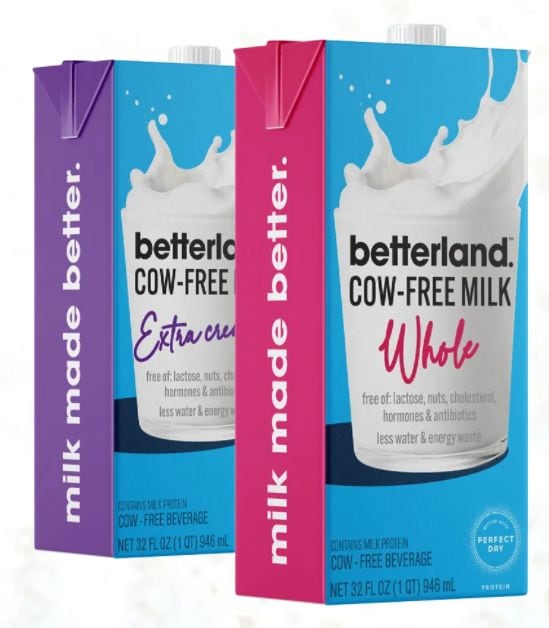
Nutritionally, it matches dairy milk for protein content (8g per serving) and vitamins and minerals, with significantly less sugar (4g vs 11g), and slightly more saturated fat (7g vs 5g), although in other respects it is slightly different, given that regular cow’s milk contains myriad components beyond beta-lactoglobulin (the whey protein from Perfect Day in betterland milk), to alpha lactalbumin (the less prevalent type of whey protein in cow’s milk), casein proteins (the major proteins in cow’s milk), lactose (milk sugar), lactoferrin, transferrin, immunoglobulins, conjugated linoleic acid, and so on.
On the labeling front, while betterland milk is clearly being positioned as a straight alternative to cow’s milk, the clear use of 'cow-free' as a qualifier spells out that this is not made from cows, says the company (although this will require some consumer education, as the label also spells out that the product 'contains milk protein').
'Animal-free milk made with Perfect Day can deliver the functionality and nutrition of cow’s milk without the environmental or ethical concerns'
So who does betterland foods see as the target consumer for this product?
According to Falsetto: "We have made milk that caters to everyone, from consumers that have changed their diets to accommodate a new lifestyle to those that chose to give up milk for animal related cruelty and environmental implications. Consumers have been trying plant-based milks for both personal and planet-based health reasons, but have been disappointed time and time again that those products don’t taste or perform like traditional milk.
"betterland milk is creamy and rich and performs better than other plant-based milks, while delivering the same cooking, whipping, steaming, frothing, and baking functionality. It absolutely is key that this milk performs like traditional milk, but more importantly, it is the impact that this milk has on the environment that we really should be talking about. We’ve created a milk that is kinder to the environment without compromising on taste or nutrition."
'Clear gaps exist between plant-based and cow’s milk in terms of nutrition and functionality'
Asked to place the innovation in the broader context of the alt milk landscape, Perfect Day co-founder Perumal Gandhi said: "We’ve spent years working on the R&D behind this product, which is often referred [to] as a holy grail of protein innovation.
"What we’ve learned over the course of this time, and through various trials and tests, is that clear gaps exist between plant-based and cow’s milk in terms of nutrition and functionality. Animal-free milk made with Perfect Day can deliver the functionality and nutrition of cow’s milk without the environmental or ethical concerns."
Dr Rachel Cheatham: 'What will be interesting is when a brand, or partnership of brands, can produce each and all of the nutritional components of cow's dairy milk via a full suite of bioengineering techniques'
While any attempt to displace the fruits of industrialized animal agriculture with more ethical or sustainable alternatives is commendable, Dr Rachel Cheatham at food and nutrition consultancy FoodScape Group told FoodNavigator-USA that, "Bioengineered food ingredient frameworks are in a reductionist nutrition phase. In other words, just because a brand can make whey protein without cows doesn't mean they can make nutritionally equivalent 'milk' without cows.
"By focusing squarely on the protein component, the full nutritional value found in the naturally-occurring dairy milk matrix is essentially lost in translation. Meanwhile, gums, starches, flavoring agents, and various additives are necessary for taste and texture, which clean label-focused consumers are not always fond of seeing."
But she added: "What will be interesting is when a brand, or partnership of brands, can produce each and all of the nutritional components of cow's dairy milk via a full suite of bioengineering techniques. That day will come and that day will be a game-changer."
NMPF: 'Lab-developed beverages don’t meet FDA standards of identity for dairy products'
Alan Bjerga, SVP communications at The National Milk Producers Federation (NMPF), which has long argued that the FDA has been turning a “blind eye” to alleged violations of its own standards of identity (which define milk as the lacteal secretions of cows) – told FoodNavigator-USA:
“Lab-developed beverages don’t meet FDA standards of identity for dairy products. Lab-based products also do not come anywhere near matching the full range of micronutrients and proteins contained in actual dairy products [although betterland foods pointed out that it has matched the protein level the vitamin and mineral content in dairy milk].
"And sustainability claims made by dairy competitors are quite often based on selective interpretations [although Perfect Day pointed to a recent lifecycle assessment (LCA) - conducted by consultancy WSP USA and critically reviewed by a panel of independent experts in conformance with ISO Standard 14067 on GHG emissions – which showed that its non-animal whey protein has a dramatically lower environmental footprint than animal-derived whey protein]."
He added: "Dairy farmers welcome market competition. We can only hope that such competition is fair and transparent; based on past experience, we doubt that some of our competitors share these goals.”
“This is an incredible moment when we can finally deliver a product consumers have been asking us for since day one.” Ryan Pandya, co-founder and CEO, Perfect Day
“In the five years after selling Think!, I kept an eye on the space of protein innovation. When I saw what Perfect Day founders Ryan and Perumal were doing to cultivate nutritious, more sustainable alternative milk proteins, I felt the pull to not only get back into the industry, but to help build a portfolio of products that taste great, while being better for the planet.. betterland milk is the next evolution of milk that our world needs today.” Lizanne Falsetto, founder and CEO betterland foods
What is animal-free dairy?
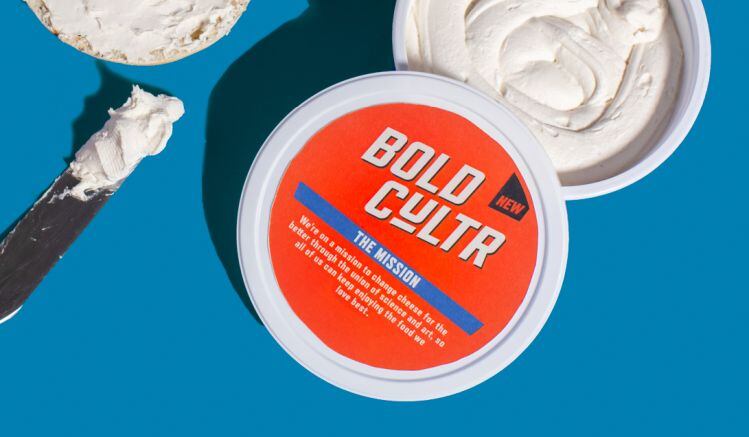
There is no formal definition of ‘animal-free’ dairy – a term being tested by some startups in the space – but it typically refers to products made with ‘real’ dairy ingredients (whey, casein, etc.) that are produced without cows, either via genetically engineered microbes (Perfect Day, Brave Robot, Change Foods, New Culture, Formo, Remilk, Imagindairy, Those Vegan Cowboys) or genetically engineered crops such as soybeans or peas (Nobell Foods, Moolec Science).
Using synthetic biology, firms in this space use DNA sequences like pieces of computer code to program or instruct plants or single celled organisms such as fungi and yeast to express animal proteins.
The final proteins do not contain any modified genetic material and are already familiar to the food industry (in its GRAS determination for its animal-free whey protein, which is expressed by a genetically engineered strain of the filamentous fungus Trichoderma, for example, Perfect Day notes that it is "identical to commercially available bovine-produced β-lactoglobulin”).
Making ‘real’ dairy products without cows, argue animal-free dairy proponents, offers the best of both worlds: more sustainable and ethical products that don’t involve industrialized animal agriculture, but still deliver the nutrition and functionality of ‘real’ dairy.
Animal-free whey proteins from Berkeley-based Perfect Day - a pioneer in the animal-free dairy space - now feature in BOLD CULTR animal-free cream cheese from General Mills, several ice cream brands including Brave Robot and Nick’s, the Modern Kitchen animal-free cream cheese brand launched by The Urgent Company (backed by Perfect Day), Brave Robot cake mixes, and vegan protein powders from Natreve, and California Performance Company (the third brand launched by The Urgent Company).
Starbucks has also been testing items featuring milk and ice cream products from Perfect Day in a couple of its coffee shops in the Pacific Northwest.
Animal-free casein proteins - which are more challenging to create without cows on a large scale - are still under development, although several startups say they are gearing up to launch cheeses featuring animal-free casein proteins in the next couple of years (there are four different types of casein protein, and it may not be necessary to produce all of them to get the kind of functionality formulators are looking for).

